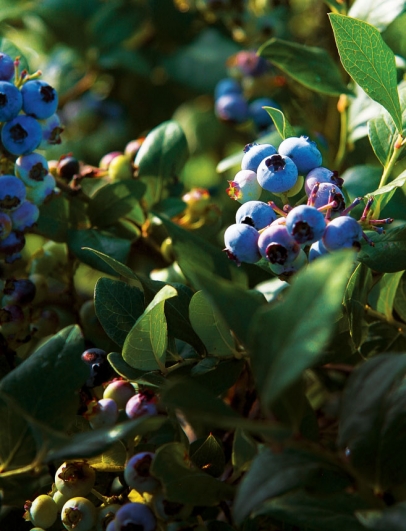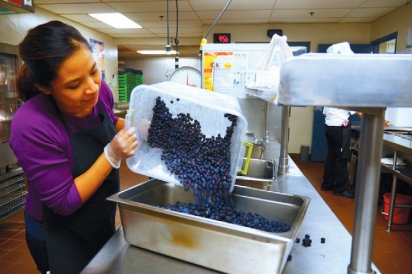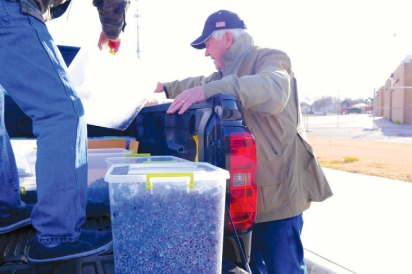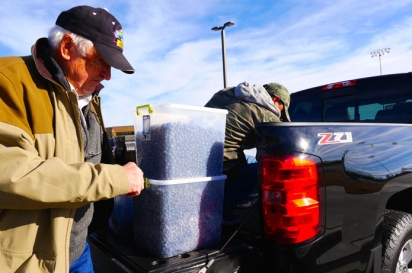Harvest of a Lifetime
Well-spent 87 years add up to a bit of wisdom and a whole lot of satisfaction
I pull down a gravel road off Hansen Drive somewhere in the reaches of Broken Arrow after spending the better part of five minutes circling a square mile, trying to find the entry point to Thunderbird Farms. A quick Google search prepared me for a literal search: Don’t use your GPS!, the reviews said. But just as the last of the sun is sneaking away, I’m met at the end of the drive by a sentry in the form of a yellow Labrador, a farm dog by any standard, happy to welcome me to the homestead.
A burgundy Chevy pickup truck pulls up, leaving a storm of dust around the wheels. “Well, the sun’s about gone,” a man says to me with a laugh over the cracked window. “Why don’t you hop in with me and we’ll take a look around the farm?”
I haven’t formally met Don Hansen yet, but with the night hot on our heels, introductions seem like little more than a waste of time. I follow his instruction and hop into the passenger seat.
“I’m Megan,” I say. “Nice to meet you!”
“Well, Megan, tell me the three things I need to know about you.”
So starts my evening with Don—warm and personal and friendly and nonchalant, a mirror representation of the man I’d come to know later.
Don takes me by rows and runs of Thunderbird Farm’s signature berry plants: blacks and blues of several varieties, kept company by potato plots and lanes that’ll welcome asparagus, sweet corn, onions and squash come spring. These berry plant crops are seasons in the making—some as old as 12 years. The thing about berry plants is that they build over time, growing richer and fuller the older they get. But for now, his are mostly sparse and, save for a few, budding prematurely.
“It’s really not good,” he says. “If they bud too soon, they won’t survive.”
This summer, they’ll be blooming with tart, juicy berries, bubbled up and prime for picking and preserving, or popping whole.
“If I could only have one kind, it would be Legacy. They’re easier to grow, taller, a mid-season berry, prolific. They’re just an all-around good berry.”
As a you-pick-’em hotspot in the Tulsa area, well-known for its “Shareberries” program (“pick two pounds for me and keep the third for free,” as Don explains it), Thunderbird welcomes hordes of hungry gatherers in the spring and summer months. When the days warm up a bit, berries will be unloaded and weighed by the bucketful at the farm’s little red shack and packed up for the ride home, where they’ll be made into pies, jams, breads, salads and every other berry dish under the summer sun.
The farm is also home to a host of animals: geese and goats and cattle, the farm dog Camus, the occasional set of flying ducks (Don says he needs to get some more), and horses, including a few rare wild beauties.
“I always wanted a buckskin,” Don tells me of his treasured horse, almost sheepishly. “She’s still wild. I just feed her and look at her. I’ve never ridden her. She’s just a buckskin, just a pet … and a real pleasure to look at.”
As the last glimmer of daytime trails off, we pack it up and head inside to Farmer Jack’s house, which sits hunkered down on the farm. Jack is Don’s nephew, and with the help of their farm hand, Antonio de la O who has specific charge over blueberries, they’re up at dawn every day to greet the sun and its demands, keeping Thunderbird up and running. Don makes me a cup of coffee, and we settle in for conversation.
I do a lot of interviews with all types of people—some talkative, some uncertain about sharing, some absolutely crazy. It’s one of the truest pleasures of my job. And every once in a while, I conduct an interview that leaves me feeling changed—humbled, invigorated, grateful or understood. It doesn’t take long to realize that this will be one of those interviews.
Don Hansen isn’t a native Oklahoman, but you wouldn’t know it by talking to him; he’s got the drawl and patience of an Okie, a product of spending most of his adult life in the plains. Don found his way to Tulsa in 1954, but it wasn’t without a few stops along the way. After a brief stint in the Navy after high school graduation (World War II was still on, but ended just a couple months after he enlisted), a buddy from Don’s hometown of Aberdeen, South Dakota, told Don he planned to attend business school in Oklahoma, of all places. He said Don might as well come along.
As Don puts it, he wasn’t much interested in business, but thought petroleum engineering sounded interesting. They both enrolled at the University of Tulsa.
“The true story is, I read through the catalog and it required courses in geology. Basically I’d never heard of geology, but I checked a book out of the library, and it was just totally fascinating to me.”
Don was hooked. Four years later, he graduated with a degree in geology, but couldn’t find work, and decided to pursue a master’s degree from the University of Minnesota. His work took him all over, including a three-year period in the Rockies where he was able practice well setting, field mapping and exploration while indulging his love of the mountains.
His curiosity paid off, and Don soon found work as a petroleum geologist, working for Sinclair, Apache and several other companies in Tulsa’s oil and gas landscape. But oil and gas was just a primer for the work he’d eventually get into.
After years of success in the O&G industry, Don was able to retire. But instead of taking his profits, buying up an old fishing cabin and lazing the days away on a dock like other retired men his age, he used his spare time to chase his true passion: farming.
Like many farmers today, Don grew up on a farm. His passion for the land is deep-seeded, and covers everything from cattle to growing. Today, the 87-year-old (you read that right) spends his days perched atop a hulking tractor, riding down rows of plants and crops, pulling plants out of the earth, sharing that experience with others—some for the first time.
“We have folks come out to pick who have never seen carrots with green tops before,” he says with a laugh.
“Is that mind-blowing to you?” I ask.
“A little bit.”
But Don says he sees a return to homegrown foods in the works, thanks to farmers’ markets, gardens and the local food movement.
“I think people appreciate fresh, homegrown food the way I do,” he says.
As someone who fears the rapid actualization of the automated age, I found meeting a person like Don—someone so comfortable with and pleased by natural, hard work—both hopeful and altogether halting. He is sincere and optimistic—a rare combination in today’s crazed, give me more now world. He is content to spend his days tilling and preparing a plot of land for someone else to enjoy, and has taught his children and grandchildren and great-grandchildren to do the same.
“We divide up the days among the grandkids to see who can be in charge,” he says. “They all know how to do it.”
And although he loves the work, he admits that it is anything but easy.
“I don’t recommend it to other people. You gotta have a passion for it. But I can’t imagine myself not farming … I get bored on a cruise.”
Being your own boss—even on a farm—has its perks. When he’s not farming, Don spends his free time exploring the far reaches of the country with his wife and still sweetheart, Nedra. Don tells me they’ve been to every state in the Union, and that they visited Cannon Beach, Oregon; Booth Bay Harbor, Maine; and Woodstock, Vermont, last year alone, and even took their RV down to see the Texas Bluebonnets.
“We’re going to Vegas on Monday just to ride the Ferris wheel!”
Indeed, Don is as spritely as any spring chicken half his age. He moves a little slower getting up on the tractor, and might need soft-talkers to speak up every now and then, but his personality is full and playful. My guess is that living to teach 22 great-grandchildren a thing or two about life and farming is good for a person’s health.
“So, after 87 years, what does success look like to you?” I ask him, ready for some wisdom. He does not disappoint.
“Success looks like leaving something that will continue after I’m gone. Something concrete.” He says the word with feeling.
“My entire life has been devoted to putting together a farm that my great-grandchildren will enjoy.”
The older I get, the more I appreciate time spent with people older than me—especially those with wisdom that stems from a connection to the earth. When I sat down to write this story, I was worried that I wouldn’t be able to do Don justice. I spent a lot of time reading Wendell Berry in preparation—Manifesto: The Mad Farmer Liberation Front. As I was trying to make sense of all the information—Don’s approach to farming, the characterization of the land, the pieces of his story and the points of connection between all of it—I kept coming back to a certain stanza:
Ask the questions that have no answers.
Invest in the millennium. Plant sequoias.
Say that your main crop is the forest
that you did not plant,
that you will not live to harvest.
Say that the leaves are harvested
when they have rotted into the mold.
Call that profit. Prophesy such returns.
* * *
It is easy to do the things you love. I believe this now more than ever after talking to Don, and after writing this story. But there is an obligation inherent in doing what you love; like farming, we must not only do it, but do it responsibly, with unfailing persistence, and with great care. And like anything worth doing, there is a certain joy in completion.
“I have been financially successful in the oil and gas business,” Don explains, looking into his coffee, as if expecting to find in it a snapshot of the past 87 years, ready to be given a grade.
“I have put together a farm, and that’s a special feeling. Owning land is a special feeling. The desire to own land … “ he puts a heavy, passionate emphasis on each syllable, “is special.”
“I’ve often quoted from Gone With the Wind … Timothy O’Hara, he said, ‘Land is the only thing in the world worth workin’ for, worth fightin’ for, worth dyin’ for, because it’s the only thing that lasts. Land is forever.’”
Call that profit.








